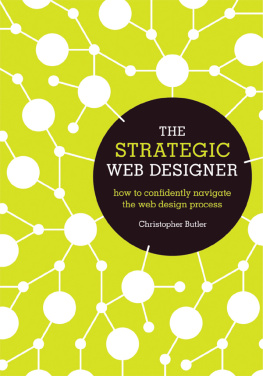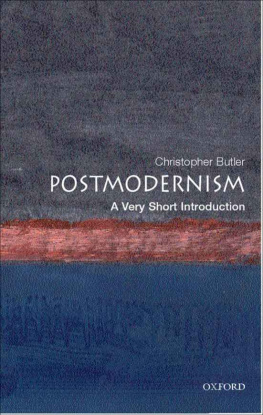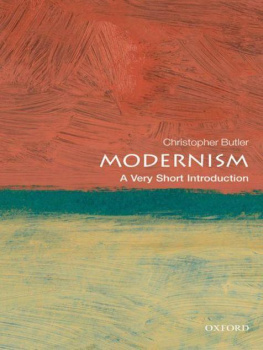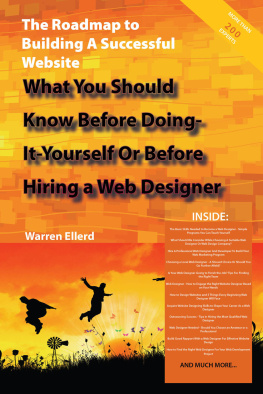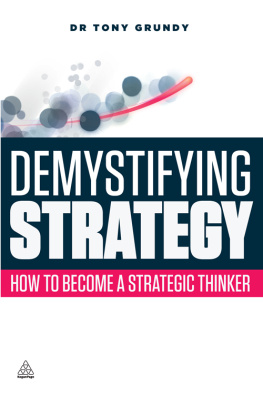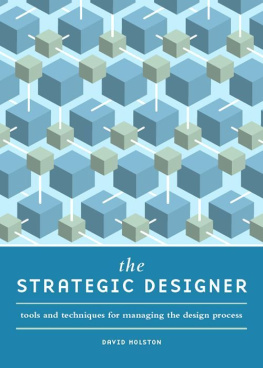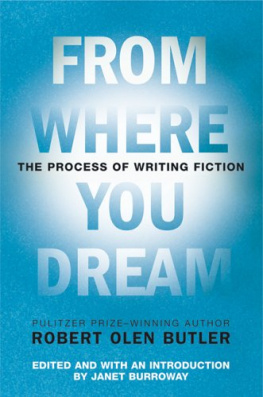The Strategic Web Designer
How to Confidently Navigate the Web Design Process
Christopher Butler
HOW Books
www.howdesign.com
What strikes me about Chris book is that hes like a zoom lens. He can see the wide picture and place it in the context of marketing historically, and then zoom right in to how that might impact how any given business would optimize their pull strategies to attract the right kind of clients. His writing is clear, buttressed with research and examples, and drags you in to read the whole book at once.
- David C. Baker, Recourses
No one is thinking more clearly or more intelligently about designing for the web right now than Chris Butler. And now, with his new book The Strategic Web Designer, no one is writing more clearly about it either. As always, Chris employs his trademark conversational approach to present some big ideas about planning, optimizing, and designing your site, and offers valuable tips on what trends to look for on the horizon. All of which will make you not only a better web designer but smarter about the web in general.
- Aaron Kenedi, Editor-in-Chief, Print magazine
Christopher Butler has created a concise, poetic guide about to how to be strategic about your website work, from planning to prototyping, from measurement to mobile. There are countless resources out there that tell you how to design for the web. But this is one of the few that will help you think critically about how to do it better, and what the future of the web might hold for your practice.
- David Sherwin, author of Creative Workshop: 80 Challenges to Sharpen Your Design Skills and Success by Design: The Essential Business Reference for Designers
With this book, Chris introduces a much-needed strategic approach to progressive, bulletproof web design. From the inception of a project to its final release, this book will help you understand the versatile intricacies of the design process, identify common stumbling blocks, and create the solutions your clients need.
- Vitaly Friedman, Editor-in-Chief, Smashing Magazine
For everyone who loves the web, even those who are a little afraid of it.
Introduction
This book wont teach you how to build a website. But it will teach you how to think about the web and, in doing so, prepare you to lead web projects from their inception through the ongoing nurturing process every website requires after launch. Thats what web strategy is all about: having a comprehensively informed point of view about the web that enables you to guide a web project intentionally, rather than reactively.
Consider this quote: A well-trained man knows how to answer questions; an educated man knows what questions are worth asking.- E. Digby Baltzell
Think about that for a moment. Baltzells quote gets right at what I hope is the defining characteristic of this book - what separates it from the ocean of valuable, but inherently different, material about the web that is available to you. Web strategy is a scheme for working on the web, elaborate and systematic (as the Princeton definition for strategy2 specifies), and is born out of a wide and foundational education that includes many things beyond the how-to. But the balance between education and training, or in our case strategy and implementation, is a fine one. No amount of technique will prevent a sudden change in technology from upending your ability to do what youve promised your clients you will do. But a strong foundation in web strategy - the principles by which the web, and work on the web, is conceived - will enable you to keep your bearings as the storm of technological change continues to blow over every inch of the web as we know it.
As a design student, I was required to complete an initial year of curriculum called Foundation Studies before I was able to choose a specific major of study. During that year, the required courses, which carried deceptively basic titles like Drawing, Two-Dimensional Design, and Three-Dimensional Design, provided a survey of an immense field of knowledge and practice. In my foundation studies, I felt I was exposed to far more knowledge on a variety of things that would not be relevant to my major than was necessary. But once I began my specific course work, I realized how essential that exposure was. In fact, I couldnt possibly have removed one portion of that foundation year; I used every bit of that knowledge throughout the rest of my time in school and continue to do so today, years later. You see, the school laid a foundation for every student that would be as strategically important to them whether they studied painting or landscape architecture. Each department, in turn, laid a similar foundation in its first year and created a structure through which students would gain more and more exposure to specific techniques and practice (as well as individual creative freedom) as the semesters progressed. As many of my classmates would likely say, we learned first how to think about design, then how to do it.
So thats what this book is all about: learning first how to think about the web and web projects so that you can truly take the lead in the way your clients are hoping you will. Where it doesnt cover specific techniques, it will point you to the current best resources that will. But fear not: It will cover a great deal.
In . Finally, the Notes section contains all kinds of information that I encourage you to explore, from references to expansions on points, as well as resources to assist you in further investigations of just about everything covered in this book.
What Is the Web?
Everyone knows what the web is, right? Im actually not so sure.
In a highly unscientific survey, I asked around and received a variety of descriptions. Here is a representative sample of them:
Its a window to the world through which you can meet people from anywhere and find virtually any piece of information that exists.
Its a constantly available and accessible answer to almost any fact-based question you have.
Its a digital network of content.
These definitions, gathered from people within my network (which certainly leans digital), should theoretically be accurate. But as I read through them, it is evident that something is missing. The first one describes the web as a tool that enables us to find answers to questions. On the other hand, the second describes the web as the answer itself. The third removes the distinction altogether. In light of the first two, perhaps the third suggests that web content can be either a question or an answer, depending upon you.
These three descriptions of the web are indicative of the struggle we have with being able to distinguish between what the web is and what the web enables us to do. While some people tend toward one description more than the other, most depend so heavily upon metaphor that their collective purpose - the meaning they are intended to provide - is lost. Its as if I were to ask for a description of air. I might hear anything from the chemical makeup of our atmosphere to how wed die without it, but its ubiquity is sure to make a pithy account hard to come by.
So, then, what is the web? Does it have an identity separate from its content, its uses or even the tools we use to access it? Is the web actually something, or is it just an idea?
As a next step, I thought that studying the origin of the web might help to clarify these questions. Here, from his original 1989 proposal for the World Wide Web, is Tim Berners-Lees description of his intent for the web - what it would be and how it would work:

